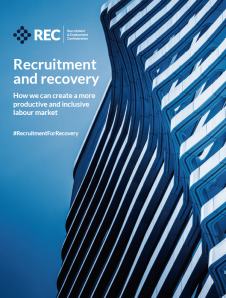Recruitment and recovery full report (PDF)
Download the full report in a PDF format, so you can save, share, print and read at your leisure.
Recruitment insights
"Getting recruitment right boosts UK productivity by £7.7bn each year."
In order to better understand the value created by the recruitment industry, REC commissioned independent consultancy Public First to measure the industry’s economic and social impact and UK labour market trends. Using a combination of new modelling, research and extensive polling of workers and businesses, we sought to better understand the impact of good recruitment.
The industry directly employs 119,000 people and helps over a million other workers find a job each year in companies across the UK. Covid-19 has had a significant short-term impact on all of us - but the wider changes in flexible work, diversity and inclusion look only to increase the importance of good recruitment in the future. Our study shines a light on three core themes:
Since I started in the industry in the 90s, I have always been proud of being a recruiter. Because recruiters change lives.
But we know that this can go under the radar. That’s why, as thoughts at the REC turned from helping the industry through the Covid crisis to positioning us for recovery, we decided to delve a little deeper. What is the difference professional recruitment expertise really makes?
As this report sets out, the answer is a stunning amount. Growth and productivity unlocked for clients. Opportunity opened up for workers. An economy fired up, where employers choose to work with professional recruiters delivering a value-added service.
We are going to shout about this throughout the year – to businesses, the media and in Government. We’ll support you to use it in making the case with your clients and other local businesses.
As recruiters, we should walk tall. We make a difference.
Neil Carberry, CEO, Recruitment & Employment Confederation
On this page, you will find:
The recruitment industry plays an important role in enhancing the competitiveness and productivity of the UK economy.
Alongside its significant direct impact of over £86bn per year, the industry also helps create better matches between workers and companies.
"77% of companies say that on average the workers they've found through a recruitment agency are a good match."
Finding the right worker for a vacancy is far from straightforward.
When we asked companies why they used recruitment agencies, freeing up time and focus for management was an important consideration. While businesses often initially turn to agencies for their sector expertise and the depth of their candidate pool, they also report finding valuable other longer term and more strategic services, including help with their employer brand, advice on overall workforce planning or providing training and development.
Hiring the wrong worker can be extremely costly. In Public First’s business poll, businesses estimated that poor hires contribute on an average around 25% less value than a good match. Previous REC research has estimated that the overall cost of a bad hire to a business can be three times higher than just a wasted salary.
But, even more important, finding the right candidate can positively create value for the employer. On average, businesses estimated that top performers can create around 50% more value for the company.
Since 1980, the number of the self-employed has more than doubled in absolute terms, and increased its share of the total workforce by around a half. Similarly in the mid-1980s, there were only around 50,000 workers employed on a temporary basis through an agency. Today, on an average day in normal times, there are over one million. For businesses or public sector organisations, having access to temporary workers makes it possible for their company to be far more agile.
In our business survey, we saw the importance of temporary employment for the economy - and how largely this was being enabled by the recruitment sector:

The recruitment industry plays an important role in social mobility, helping people find new jobs and build their careers.
When we asked temporary workers what they had gained as a result of their placement:
"78% of people who found a job through a recruiter say it was a good match for them."
One reason that workers often desire more flexible working hours is to balance their job with other responsibilities. Every year, around 280,000 people use temporary work to help support them while they care for their families. The majority of those who have used an agency to find temporary work report having had a good experience:
For many workers, temporary work can help support the transition between unemployment and the rest of their career. Every year, over 300,000 people use the recruitment industry to leave unemployment for a permanent role.
How good a job are British companies doing at recruitment?
When we dived deeper into what companies did, it was clear that there was still significant room for a recruitment process that was fairer, more effective and more inclusive.
The main tools of choice in recruitment for businesses of all sizes remains the interview and the CV. However, while important, independent research has often found that the interview by itself is not enough and that the form of the interview matters, while CVs do not always give a full picture of a candidate and often embed discrimination.
2020 highlighted the importance of prioritising diversity and inclusion. Unfortunately, all too often, recruitment processes do not do enough to reach a diverse pool of candidates, encourage them to apply and make them feel welcome when they arrive at work. Academic research has repeatedly found that CVs with white-sounding names are more likely to get a response than those from a minority.
Many of the companies we spoke to believed that they were already doing reasonably well at ensuring diversity in their workforce - but there is also a long way to go.

Throughout the pandemic, the recruitment industry has helped keep vital services running. Looking forward, the industry is likely to play a key role in helping displaced workers find new jobs, helping companies adapt to shifts such as the rise of remote working, and helping build a more diverse and inclusive labour market.
"Covid-19 is accelerating the shift towards a more flexible labour market. One in four (28%) large businesses told us that they were likely to explore hiring people who do not live close to the office in the future, while remote working itself could boost UK productivity by £9 billion."
Throughout the course of the pandemic, recruitment companies have played a crucial role in helping keep the economy going. Given their expertise in agile and temporary work, recruitment companies are often well placed to support other essential organisations: from helping hospitals find extra nursing staff to ensuring that there are enough workers to put food on supermarket shelves.
Looking forward, the industry is likely to continue to play an important role, helping the economy adjust to a post-Covid world and workers find new long-term roles.
The pandemic looks to have accelerated wider structural changes in the labour market and the way companies recruit. The rise of hybrid and remote working has the potential to significantly expand the pool of candidates companies can access, and make it easier for candidates to access the most interesting vacancies, no matter where they live.

Spreading good recruitment practice should be taken as seriously as encouraging digital adoption or better management skills in companies.
We need to help workers progress - for instance by broadening the Apprenticeship Levy so it can be used as a funding mechanism for training temps.
We can support better diversity & inclusion - including working with employers to avoid bias in the recruitment process.
Lets take advantage of the remote working revolution & help those who are unemployed access a wider pool of vacancies from further afield.
And finally, we commit to working with Government to maintain our flexible labour market. In return, we want Government to work with us so that all employment laws take agency and temporary workers into account from the outset, rather than be drafted with only employees in mind.

Here you'll find a range of videos, case studies and blogs to support your conversations with key stakeholders. We've also developed a toolkit specifically for REC members to support your client discussions.

Included in your toolkit are:
Share your stories, thoughts and lessons with the wider network using #RecruitmentForRecovery.
Share this article